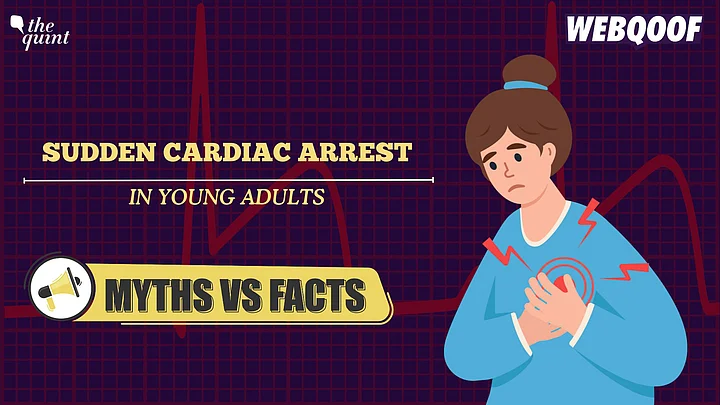Incidence of Sudden Cardiac Death (SCD) in young people is a rare but alarming occurrence. According to medical definition, when the heart stops beating, it automatically stops pumping blood and this results in a cardiac arrest.
A cardiac arrest typically leads to the person collapsing, becoming unresponsive which then leads to death.
According to a study titled, 'Sudden Cardiac Death in Young Individuals' (2023), while some SCD can be attributed to coronary heart disease (CHD) - especially ones in the 31 - 35 age range - or structural heart disease, many instances of SCD remain “unexplained”.
Several young adults now experiencing SCA due to diseases like undiagnosed diabetes, sedentary lifestyles, increasing consumption of alcohol, smoking and also hypertension.
People are often unaware about the symptoms, which is why it is important to create awareness around SCA, especially among the youth. This World Heart Day, which is celebrated on 29 September every year, lets bust some myths around SCA.
Myth 1: Sudden Cardiac Death (SCD) is Always Hereditary
While genetics can play a role in some cases of SCD, especially in younger individuals with inherited heart conditions like hypertrophic cardiomyopathy or arrhythmias, SCD is not always hereditary, explains Dr Suryadevara, Interventional Cardiologist, Apollo Hospitals.
A study titled 'Sudden cardiac death in the young: a genetic destiny' (2018) states that different heart conditions and diseases that result in SCD and while some of them are indeed hereditary, not all of them are.
Many cases of SCD are also due to lifestyle factors, such as poor diet, lack of exercise, smoking, or untreated conditions like high blood pressure or diabetes.
Dr Suryadevara states that it is crucial to recognize that anyone can be at risk, regardless of family history. Preventive health measures, regular check-ups, and managing risk factors are key in reducing the likelihood of SCD.
Myth 2: SCD Only Affects Athletes
It is true that athletes are at higher risk due to intense physical exertion revealing underlying heart conditions, but it is also true that SCD can affect anyone, not just athletes.
"Majority of SCD cases occur in individuals who do not engage in regular sports activities. People with heart disease, hypertension, or even those with an undiagnosed heart condition are at risk. It’s important for everyone, not just athletes, to monitor their heart health," says Dr Prashant Pawar, Consultant-Interventional Cardiology, Fortis Hiranandani Hospital
Myth 3: There Are No Warning Signs
According to a study titled 'Symptoms Preceding Sports-Related Sudden Cardiac Death in Persons Aged 1–49 Years' (2023), the possible symptoms of SCD can be categorised as prodromal or antecedent symptoms.
Prodromal symptoms occur hours to minutes before the onset of death, while antecedent symptoms often evolve gradually over days to years before death.
The research also adds that the most common symptoms that precede SCD includes pre-syncope, syncope, palpitations, chest pain, shortness of breath, generalized malaise, lethargy, infections, and gastrointestinal symptoms.
Another study titled 'Symptoms preceding sudden cardiac death in the young are common but often misinterpreted' (2005) states that prior to SCD, chest pain was a predominant symptom in individuals aged 30 years or above, where individuals who are less than 30 years of age had syncope/pre-syncope as the most common presenting symptom.
"SCD may seem to strike without warning, but there are often subtle signs that are overlooked. Symptoms such as chest pain, shortness of breath, palpitations, or unexplained fatigue may precede SCD. These symptoms should not be ignored, especially in individuals with known risk factors like a history of heart disease," adds Dr Suryadevara.
Dr Pawar also states that some individuals may also have a prior history of heart conditions such as cardiomyopathies, channelopathies, or previous heart attacks, who might then experience SCD.
Myth 4: SCD is Always Preventable
While a healthy lifestyle and good medical care can reduce the risk of SCD, it’s not always preventable, asserts Dr Suryadevara.
SCD can also sometimes be genetic and this may be difficult to detect before a serious event occurs. As per a study mentioned above from 2023, both pharmacological and primary prevention methods can be performed in order to prevent the incidence of SCA. It highlights that one should ensure the timely treatment along with a timely diagnosis of potential SCD.
"However, regular screening for heart disease, managing blood pressure, cholesterol, and avoiding risk factors like smoking can significantly lower the chance of sudden cardiac events," adds Dr Suryadevara.
Myth 5: There's Nothing One Can Do if Suffering From SCD
According to a study titled 'Sudden Cardiac Death' shared in 2022, it is important to manage SCD in the initial stage as it is a time-sensitive process aimed which aims at restoring cardiac function and improving the chances of survival.
"Immediate cardiopulmonary resuscitation (CPR) and the use of an automated external defibrillator (AED) can restore the heart's rhythm. While SCD can be fatal, prompt intervention within minutes can help prevent death," says Dr Suryadevara.
Dr Pawar says this claim is false and explains how timely intervention is crucial for saving lives. "Bystanders play an important role as those who recognize the signs of a cardiac arrest can begin CPR promptly and can make a significant difference. Continuous, high-quality CPR and the use of an AED have helped prevent numerous deaths in our country," he adds.

